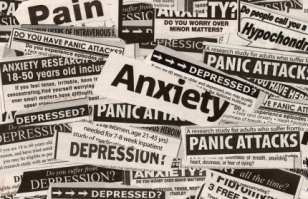“I grew up with a family that loved me unconditionally, I was a typical child who loved to sing, read and watch movies, but I always felt a little bit different. I constantly worried and it wasn’t until I was older that I understood why.
My first real panic attack was in university, although I didn’t know what it was at the time. I suddenly got the shakes, my heart racing and felt like I couldn’t breathe. That landed me in the emergency department, getting blood tests and EKG’s for my chest pains. When doctors told me they couldn’t find anything wrong with me, I felt embarrassed. I felt crazy when it happened again twice and was told the same thing.
My parents thought I should see a psychologist, and it was then when I learned I was suffering from generalized anxiety disorder. I had uncontrollable worries and felt constantly tense. Sometimes, I would get panic attacks during class. These symptoms would last anywhere from a few minutes to an hour. A year later, I was also diagnosed with depression. My life seemed to be spiraling out of my control. I didn’t know how to deal with it all and I ended up taking a semester off from school and isolated myself from everyone.
It was a battle, but now, although I still worry and get anxious, with the help and support of friends and family, I can say that I haven’t let my anxiety disorders control my life- now I control them.” ~Anonymous
Emotional complexity and functioning challenges influence depression and anxiety. The combined impact these disorders have on one’s life is the most prominently experienced mental health concerns in society. Depression and anxiety can be triggered through a multitude of factors such as emotional, social, physical, environment, nutritional and spiritual factors, however it could also be a result of ones genetic make up2. Anxiety and depression are not the same, but they are interrelated and often occur together2.
Anxiety disorders cause unexpected anxiety that seriously impacts ones life, including how one thinks, feels and acts1. Anxiety can affect anyone for different reasons. Sometimes, it could be triggered by a specific event or stressful life experience1. The different types of anxiety disorders include: panic disorder, social anxiety disorder, specific phobias and generalized anxiety disorder3. Anxiety disorders cannot be prevented, but with the help of counselling, seeking help from a professional and the support of friends and family can help control or lessen symptoms. Remember, if you are suffering from depression, anxiety, or any other mental disorder, you are not alone and you will get through it!
~Joti, Humans of Depression Representative
Remember to follow Humans of Depression on the following platforms!
https://www.facebook.com/HumansofDepression
http://instagram.com/humansofdepression/
References:
(1) http://www.cmha.ca/mental_health/understanding-anxiety-disorders/#.VNMH-2TF_3o
(2) http://www.takingcharge.csh.umn.edu/conditions/anxiety-depression
(3) http://www.webmd.com/anxiety-panic/guide/mental-health-anxiety-disorders






